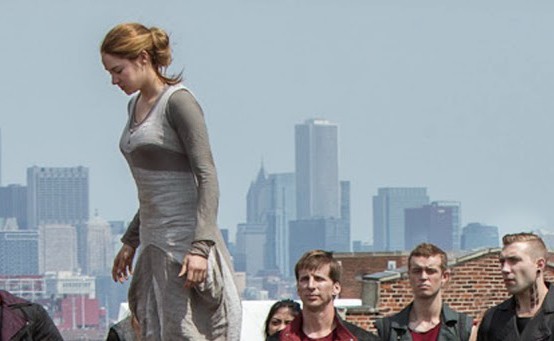Divergent: YA dystopian allegories
Divergent: YA dystopian allegories
Conceptually, Veronica Roth’s Divergent works really very well for its target, young adult (YA) audience. It reframes notions of fitting into certain categories by which the rest of your life might be lived, i.e. by selecting a faction. To be “divergent” is to belong to more than one faction - in real terms, to be a rounded human being with multiple core values, rather than just one. Perhaps you can be brave and also be selfless; perhaps you can value learning and honesty at the same time. Divergent’s faction system throws into question what it might mean to choose an identity, whether indeed we can choose our identity. How do we choose what our core values are, how can we choose who we are (on our own terms) when the world we live in seems to be concerned so deeply with fitting us into boxes?
Tris is an attractive heroine to YA readers because she doesn’t just demonstrate the teenage struggle of being faced with seemingly impossible and enormous decisions that will apparently determine the course of her entire future, but also because her divergence could not be more human. (I’m reminded of the seemingly huge stakes around choosing GCSE subjects, or having to choose who to sit next to in French for the next three years.) Other characters in the story who belong neatly and clearly to one faction seem to have something unsettling about them in their lack of complexity or dimensionality in comparison.
Something about the faction system might resemble the cliques of secondary school cafeterias; something about the initiation process might conjure memories of those first few weeks or months at a new school, finding your feet and your allies. Particularly as the reader is following Tris into her Dauntless initiation, we’re engaging (alongside her) with a process of facing fear and uncertainty head-on. We can see the different ways people might respond to fear - violence, malice, manipulation, disassociation, retreat - and are allowed to understand Tris’ mental state and thought processes as she faces and manages her fears in order to pass her initiation.
Also, Tris’ divergence allows her to see the simulations she’s put through for what they are, and indeed manipulate them without realising she can (at least initially). The very thing that sets Tris apart from her peers as a threat to society and even to herself becomes a strength which she can use to her advantage so she might be able to survive this cutthroat system. It’s a cliché, but it’s true of this story that our main character’s apparent weakness is in fact her greatest strength.
How does this all translate into film? There’s always something quite exciting about seeing dystopian YA worlds visualised, and I think the world of Divergent is translated into film very faithfully. Details like the non-stop train and its movement through the city, the colour palettes of the different factions and their costuming, and the technology and infrastructure of the city all come to mind. We still follow Tris as our main protagonist and her voiceover narration at the end of the film gives us somewhat an insight into her thoughts so we can reflect on her journey with her.
Maybe if there are any ways in which the book and film are divergent (I apologise), it’s in the relative ages of the actors to the characters they’re supposed to be playing. Obviously this is common in film, so it shouldn’t really make a huge difference to how we view the film and connect with its characters. (The actors may be aged up from their characters but in relation to each other they are all pretty much aligned.) Maybe we find it difficult to connect the book characters to their film counterparts because we expect to see on screen young people for whom this is their first tentative foray into the “real” world. Older actors in YA film adaptations perhaps lack the sense of fear and trepidation we can see (or rather read) in a book. This is not to criticise the acting performances of the Divergent cast, they’re great, but simply to say it’s easier for a teen reader to imagine the anxiety of a sixteen-year-old character than have to imagine that the clearly-older-than-sixteen actors genuinely have the same anxieties as those teen readers themselves. There seems to be a gap in understanding and empathy here. Young adults want and need to be able to see themselves on screen.
That’s just the first film and book in the series, although to be completely honest I found the rest of the series relatively unmemorable so perhaps we ought to quit while we’re ahead. Overall, Divergent isn’t a bad film, nor is the film really a bad adaptation. It’s an inevitable product of adaptation that there will be something missing or lacking, and for Divergent I think that missing thing might be the sense that the book seems genuinely concerned with the dystopian world’s connections to the “real” world, whilst the film is more interested (being a visual medium) in bringing that dystopian world to life in a more tangible way than the purely literary imagination might be able. It seems that the result is a kind of dislocation of significance or of the story’s extended metaphor. As I’ve said, that doesn’t make it a bad adaptation - discontinuities are pretty inevitable - but the interesting thing about looking at these versions next to each other is that we have to confront those gaps and ask what we might miss otherwise.




Comments
Post a Comment